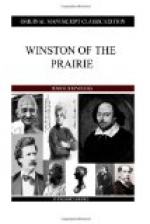He dismounted beside the oats which he would harvest first, and listened with a curious stirring of his pulses to their musical patter. It was not the full-toned song of the wheat, but there was that in the quicker beat of it which told that each graceful tassel would redeem its promise. He could not see the end of them, but by the right of the producer they were all his. He knew that he could also hold them by right of conquest, too, for that year a knowledge of his strength had been forced upon him. Still, from something he had seen in the eyes of a girl and grasped in the words of a white-haired lady, he realized that there is a limit beyond which man’s ambition may not venture, and a right before which even that of possession must bow.
It had been shown him plainly that no man of his own devices can make the wheat grow, and standing beside it in the creeping dusk he felt in a vague, half-pagan fashion that there was, somewhere behind what appeared the chaotic chances of life, a scheme of order and justice immutable, which would in due time crush the too presumptuous human atom who opposed himself to it. Regret and rebellion were, it seemed, equally futile, and he must go out from Silverdale before retribution overtook him. He had done wrong, and, though he had made what reparation he could, knew that he would carry his punishment with him.
The house was almost dark when he reached it, and as he went in, his cook signed to him. “There’s a man in here waiting for you,” he said. “He doesn’t seem in any way friendly or civil.”
Winston nodded as he went on, wondering with a grim expectancy whether Courthorne had returned again. If he had, he felt in a mood for very direct speech with him. His visitor was, however, not Courthorne. Winston could see that at a glance, although the room was dim.
“I don’t seem to know you, but I’ll get a light in a minute,” he said.
“I wouldn’t waste time,” said the other. “We can talk just as straight in the dark, and I guess this meeting will finish up outside on the prairie. You’ve given me a good deal of trouble to trail you, Mr. Guyler.”
“Well,” said Winston dryly, “it seems to me that you have found the wrong man.”
The stranger laughed unpleasantly. “I was figuring you’d take it like that, but you can’t bluff me. Well now, I’ve come round to take it out of you for slinging that decanter at me, and if there is another thing we needn’t mention it.”
Winston stared at the man, and his astonishment was evident, but the fact that he still spoke with an English accentuation, as Courthorne did, was against him.
“To the best of my recollection, I have never suffered the unpleasantness of meeting you in my life,” he said. “I certainly never threw a decanter or anything else at you, though I understand that one might feel tempted to.”




